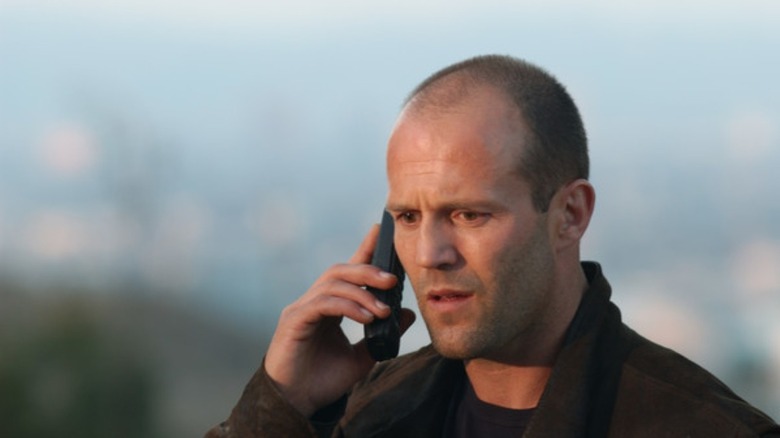Not each film could be — or must be — an unforgettable masterpiece. A much-needed house must be carved out for enjoyable, honest B-movies that you just out of the blue keep in mind on a Saturday night time and determine to revisit. One of the best form of mediocre, but pleasant movies are those that strike an ideal stability between compelling suspension of disbelief and senseless disbelief. One such title that hits this candy spot is the 2004 crime thriller “Mobile,” starring a pre-Captain America Chris Evans and a pre-“Quick & Livid” Jason Statham. If you have not watched it, or do not keep in mind too many particulars, I’ve obtained you lined.
Earlier than we dive into the “Mobile” expertise, we have to discuss Joel Schumacher’s 2002 thriller, “Cellphone Sales space.” Within the movie, an unnamed, scheming sniper (Kiefer Sutherland) calls a telephone sales space, which is answered by a younger publicist named Stuart (Colin Farrell). That is no unintentional telephone name, because the sniper is intimately conscious of Stuart’s life, which he makes use of as leverage for blackmail. The tense drama morphs right into a morality play of types, as Stuart is a somewhat horrible particular person caught in a harmful state of affairs, which raises questions on karmic justice and levels of culpability. Author Larry Cohen had conceived the barebones of “Cellphone Sales space” 20 years earlier than its theatrical launch, which explains a few of the inflexible ethical dilemmas offered on this early 2000s suspense story.
Cohen additionally got here up with the fundamental premise for “Mobile,” and wrote an preliminary script that tackled the themes of narcissistic self-obsession as a result of society’s over-reliance on — you guessed it — cell telephones. This model of the script was solemn and cynical, the place the protagonist wrestled with guilt whereas attempting to defend family members from the results of his actions. Finally, screenwriter Chris Morgan (who has written a number of screenplays for the “Quick & Livid” franchise) reframed it as a story celebrating the heroism of the Everyman, the place conventional motion and thriller components have been combined with situational humor. This system, though clichéd, labored, as “Mobile” is fondly remembered as a good suspense thriller with grounded performances.
Mobile evokes suspense and thrills by way of its cellphone motif
“Mobile” opens with science trainer Jessica Martin (Kim Basinger) being kidnapped and held prisoner by a bunch of males. The criminals demand one thing from her husband Craig (Richard Burgi), however Jessica has no concept what it’s. After the gang’s chief, Greer (Statham), smashes a wall telephone to forestall her from escaping, Jessica makes use of good ol’ science to piece collectively some wires and make a random name. This determined name for assist reaches Ryan (Evans), a younger man who thinks she is taking part in a prank on him and would not take her phrases critically in any respect. After some irritating forwards and backwards, Ryan decides to have her discuss with native cop Mooney (William H. Macy), however issues solely get extra harmful when Jessica’s child can also be discovered lacking.
Sure, the premise sounds a bit unbelievable, and may I say, irritating, when you contemplate how a lot time Ryan and the police waste debating whether or not Jessica’s misery name is real or not. However director David R. Ellis presents these gimmick-laden situations with sincerity, the place essentially the most farfetched conditions sound believable throughout the context of the movie’s fictional setting. It is a marker of competent filmmaking, however “Mobile” would in all probability be branded as a generic thriller if it have been launched right now. Nevertheless, Ellis’ pleasurable thriller is cushioned with a model of B-movie nostalgia that holds up fairly effectively, with the Evans-Statham-Basinger mixture ticking all of the bins related to the motion/thriller style.
What “Mobile” does greatest is it would not present Evans’ Ryan with beefy plot armor. As a substitute, he is anticipated to unravel the trickiest obstacles with pragmatic problem-solving versus action-hero shenanigans. And he does, going so far as grabbing a random gun to scare off prospects at a store so he should buy a charger for his dying battery (whereas being chased by thugs). This sort of situational humor balances out the overtly dramatic facets, plus it is refreshing to see Evans in such a grounded, but carefree position as a mean Everyman.
Ultimately, all of those sentiments feed into how cell telephones are insanely helpful little machines that may document proof, place emergency calls, and in addition be used as intelligent purple herrings. Is it simply me, or is it time to (re)watch “Mobile”?



